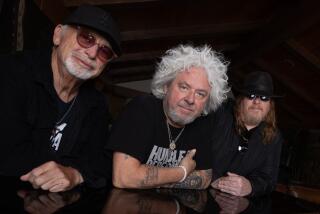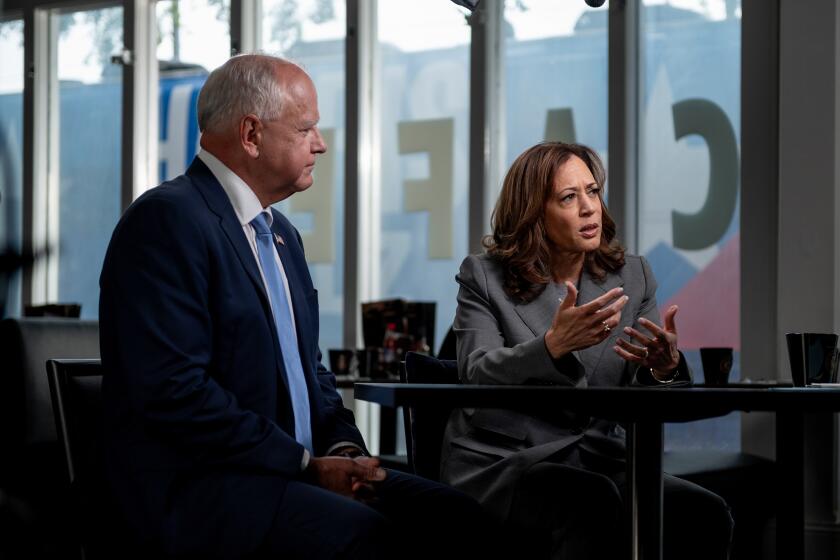What’s in the Cards for Woody Allen? : Movies: The filmmaker’s departure from TriStar leads to questions regarding the impact of his personal life on his career.
Is Woody Allen finished in Hollywood?
Yes, say some who believe his personal problems compounded with his lack of commercially successful movies over the past seven years have now caused the film community to distance itself from the Oscar-winning writer-director.
But conventional Hollywood wisdom says that all it would take is for one of Allen’s pictures to show commercial promise and the town would develop a convenient case of amnesia and clamor to be back in business with the filmmaker.
Prior to his highly public court battles with actress Mia Farrow over custody of their natural and adopted children and his affair with one of Farrow’s adopted daughters, studios wanted to associate with Allen because he was such a prestigious filmmaker, despite the fact that his movies generally didn’t make money.
But now, several key production executives privately admit they would be wary of signing any deal with Allen.
“It’s tragic that his personal life has interfered with the public’s ability to watch his films, but I think it has,” said one highly placed studio executive. “You’d have to think hard before signing with him.”
*
Talk about Allen’s viability in Hollywood began swirling in the film community as news surfaced last week that the New York-based filmmaker-actor’s production deal with TriStar Pictures was ending prematurely. He had one movie remaining on a three-picture deal with the studio.
Beginning with his next, untitled production, his movies will be financed by Sweetland Films, a company run by his longtime friend Jean Doumanian, a former producer of the “Saturday Night Live” TV series. Allen’s sister, Letty Aronson, is an executive at Sweetland in charge of film production.
What was considered highly unusual was that TriStar did not hold him to the commitment to make the third film, or that the studio did not jump in with an offer to distribute his future films.
“Our deal with Woody was basically finished,” TriStar Chairman Mike Medavoy said, dismissing the notion that there was a third film. As for distributing Allen’s future pictures, Medavoy would say only that “we may work together in the future.”
Jonathan Dolgen, motion picture group president of TriStar parent Sony Pictures Entertainment, denied speculation that the company wanted to distance itself from Allen. “Sony Pictures Entertainment had nothing whatsoever to do with Woody Allen’s decision to move on to Sweetland, or with Mike Medavoy’s decision not to stand in his way,” he said in a statement.
Medavoy responded: “Cynics can say what they want” about Allen’s move. He added that “Allen initiated the change. . . . I’m one who knows that you can ride up and ride down with creative people. You just stick with them.” And he pointed out that his relationship with Allen dates to the 1970s at United Artists and later at Orion Pictures, which the former United Artists management team founded.
Last week, Allen issued a statement saying that he is “very sorry to leave a very sensitive and supportive environment at TriStar. Mike Medavoy and all the people in the organization have been wonderful to work with from a creative standpoint. But they understand that the offer from Sweetland Films is impossible to refuse.”
*
“The story is what the story is,” said Letty Aronson, in response to questions about the talk in Hollywood. “Any other story other than the one you know of as quoted by representatives of Sony, TriStar, Allen and Sweetland is garbage. If in fact there were a scintilla of truth to the so-called other side of the story, there would be even one person who would go on record.”
Friends and associates say that Allen, when presented with Doumanian’s offer, decided he could not pass by the opportunity.
Others outside his circle believe he had no choice as a result of a year of bad publicity.
“It’s probably best for both parties,” nodded one well-placed studio executive when prodded for a reaction to the announcement that Woody Allen and TriStar Pictures would part ways.
A senior studio executive said: “Nobody wants to be involved with him . . . Woody is not Woody anymore.”
When asked if his company would make a deal with Allen, another top studio executive simply said, “No. . . . If his new deal is such a good thing, how come he doesn’t have distribution?”
*
One studio vice president took the cynical view, saying: “If studio heads believed his next picture was going to be a hit, they’d say, ‘Oh his personal life has nothing to do with his professional life’ and they’d jump on the bandwagon to be in business with him.”
A lower-level executive, who worked on Allen’s films for years but like virtually all others requested anonymity, said: “Woody is becoming more and more insulated. This linking with his best friend and his sister tells me that.”
Besides financial incentives, which mean that Allen will own a larger share of his movies and be able to spend up to 25% more on his traditionally low-budget productions, the Sweetland deal might also be viewed as “going home.”
The company is based in Manhattan, which, as fans know, may as well be Allen’s middle name. And Doumanian and Allen are so close that they have had dinner “twice a week for years,” said Allen’s longtime producer, Charles Joffe. At one dinner last October, Allen successfully used the Heimlich maneuver on a choking Doumanian.
From his previous studio homes at United Artists, Orion Pictures and most recently TriStar, executives have given Allen rare creative freedoms and have frequently boasted that, while Allen films do not generate Spielberg-size grosses, there is a prestige factor from their association with his work. Even though he personally avoids awards shows, Allen won Oscars as director and for best picture for his 1977 “Annie Hall” and a writing award for his 1986 movie “Hannah and Her Sisters.”
However, no Allen film since has approached “Hannah’s” $40-million gross.
Although his last film, “Husbands and Wives,” eventually made money after its international showings, TriStar was not so fortunate with the U.S. and Canadian runs last September. The company took a risk in releasing the movie in a broader number of theaters than usual for an Allen movie, and moved the release forward, hoping to take advantage of all the publicity that resulted from the Allen-Farrow feud. But the gamble failed to pay off as the film grossed only $10.5 million in the domestic market against a reported $12 million that TriStar spent to market it and another $12 million-plus to produce it.
Allen’s change of production companies comes only weeks before TriStar is to release his latest film, “Manhattan Murder Mystery,” on Aug. 18 in Los Angeles and New York and Aug. 20 in a limited urban market run of 250 screens. The suspense comedy stars Allen, Diane Keaton, Alan Alda and Anjelica Huston.
Asked if Allen’s departure will lessen the studio’s enthusiasm for “Manhattan Murder Mystery,” Medavoy replied: “God, no. We’re excited about the film . . . it’s an old-time Woody Allen comedy.”
It wasn’t clear how Allen’s longtime producers, Jack Rollins and Charles Joffe, will fit into the new equation. But Joffe said the new arrangement “gives Woody a chance to make money for a change.” He said the two producers will continue to be associated with Allen productions.
Aronson said that all of Allen’s future films will be presented as a “Jean Doumanian production.”
Aronson added: “Let’s face it, it boils down to whether or not the pictures are good. And there’s no studio executive who would turn down making or distributing a good film, regardless of who did it.”
More to Read
The biggest entertainment stories
Get our big stories about Hollywood, film, television, music, arts, culture and more right in your inbox as soon as they publish.
You may occasionally receive promotional content from the Los Angeles Times.






